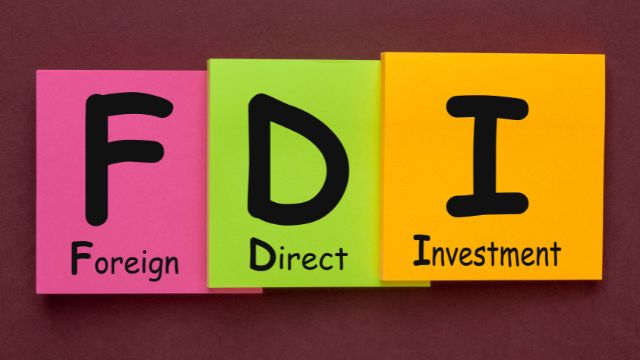If you are into geopolitics, and you understand what fuels a nation’s economy then you probably know why foreign direct investments are important for a country. Right? Well, of course, from the looks of it, foreign investments are a good thing for a nation’s economy, but is it the whole picture? Or, are there any adverse effects that you don’t know about? Well, that is exactly what our today’s post is all about because here we will be taking a good look at the most prominent advantages and disadvantages of Foreign Direct Investment aka FDI. So without wasting any time, let’s get down to the topic. Shall we?
Advantages Of Foreign Direct Investment

Let’s start off with the oh-so-good side of things, and look at why FDIs are considered a great thing for a country.
1. Boosting Economic Growth
When a foreign company decides to set up a shop in another country, it’s like throwing a big welcome party for jobs. Manufacturing units pop up, offices open their doors, and guess what? People get jobs! And jobs mean money in people’s pockets, giving them the freedom to buy more stuff. This whole cycle puts the economy on a treadmill and makes it run faster. For countries still finding their footing in the world economy, FDI is like that much-needed shot of stability and growth.
2. People Learn New Skills
Here’s the thing with the idea behind FDI, it doesn’t just throw money into the game; it also drops a knowledge bomb. Employees get to learn the tricks of the trade from international experts, whether it’s learning to code like a wizard or honing those people skills. Over time, the whole team levels up, making the country a bigger player in the global game of economic chess.
3. Technological Advancements
Get ready to geek out, because this is where the cool techy stuff comes in. FDI often means brand-new technologies roll into town. Think better machinery or whiz-bang software, stuff that local businesses might not have had access to before. This kicks productivity into high gear and might even light a fire under local companies to innovate. Basically, it’s a win-win cycle of getting better and faster at, well, everything.
4. Increase in Exports
Foreign companies aren’t just looking to sell within the host country; they’ve got their eyes on the bigger prize. They’re thinking of exports, maybe even back to their home country or other markets. So what does this mean for the host country? Well, that simply means more exports! And more exports mean more foreign currency rolling in, balancing the trade scales a bit. It’s a two-way street of benefits.
5. The Exchange Rate Stability
Let’s talk about something super important but often overlooked: exchange rates. A steady exchange rate is like a dependable friend which is always good to have around, especially in shaky times. FDI pumps in foreign capital that helps keep the currency stable, which, in turn, makes the country even more attractive for more investment. It’s like the gift that keeps on giving.
6. Improved Capital Flow
Every economy needs its lifeblood, we are talking about capital. For countries not exactly hobnobbing with international investors, FDI serves as a sturdy lifeline. Unlike fickle forms of investment that come and go like the weather, the bucks from FDI tend to stick around, contributing to projects and initiatives that push the country further up the economic ladder.
7. The Creation of a Competitive Market
Here comes the fun part. When a foreign company enters the scene, local companies have to up their game. It’s like a wake-up call to innovate and improve. But at the end of the day, who wins? You and me, the consumers. We get to pick from better products, at better prices, and life just gets a little bit sweeter.
8. Research and Development
Foreign companies often pour a lot of dough into research and development to stay ahead in the game. When they come to a host country, guess what? Some of that brainy work happens right here. This means local talent and resources get tapped into, and new inventions or ways of doing things might just spring up, giving the local tech landscape a serious boost.
Disadvantages Of Foreign Direct Investment
The perks of FDIs are great, but what about the flip side of the coin? Well, let’s find that out together.
1. The Impact on Domestic Investment
First off, let’s talk about how FDI can be a real challenge for local businesses in the country. Imagine you’re running a calm but small cafe, and then Starbucks swoops in next door with its fancy espresso machines and free Wi-Fi. The allure of foreign tech and deep pockets can leave local businesses struggling to catch up. This uneven playing field can eventually shut down small ventures, kill the spirit of local entrepreneurship, and create a one-sided dependency on foreign giants. So, rather than boosting your economy, it’s like selling your soul to a corporate devil. Long-term, this can push folks away from investing in good old homegrown brands.
2. Political Risks
Politics is a shaky ground for any investment, but especially for FDI. Ever-changing governments, flip-flopping policies, or even widespread social unrest can make foreign investors uncomfortable. They might pack up and leave, taking their money with them. This exit can leave a vacuum that sucks the local economy down the drain, especially if it had become dependent on that foreign cash injection. So, it’s not just about money; it’s also about the peace and stability of your home country.
3. Economics Risks Involved
Yeah, FDI can be a double-edged sword when it comes to economic stability. Sure, it can pump in a lot of money and jobs, but it can also trigger financial turbulence. Think about it, a rush of foreign money can push up the value of your local currency. Sounds good, but it actually makes your exports pricier and less competitive. And if these big players decide to leave? Bam! Your currency might plummet, inflation could spike, and suddenly, your economy’s wobbling like a three-legged chair.
4. The High Cost of FDI
Foreign investments often come with state-of-the-art tech, heavy machinery, and the works. While this can be great for productivity, it can sideline local labor, leading to social unrest. And let’s not forget the upkeep for all this advanced gear. It ain’t cheap, and guess who’s going to foot that bill? Yup, the consumer aka you and me.
5. Not Every Bet Pays Off
We have to admit that not all FDIs are blockbuster hits. Sometimes, they’re huge flops. We’re talking about those capital-hungry projects that eat up resources but don’t give much back. When such ventures tank, it’s not just the investors who lose big, it actually sends shockwaves through the local economy in most cases.
6. The Dark Side of Labor Conditions
Some foreign companies, particularly in developing countries, are so obsessed with cutting corners and boosting profits that they create downright shoddy working conditions. This doesn’t just make for a miserable workforce, it also taints the reputation of foreign investment in the region.
7. Economic Colonialism Today
Some critics argue that it’s a new face for old-school colonialism, where the rich countries plunder the resources, labor, and markets of their poorer counterparts, giving little back in return. This ethical imbalance can create social rifts and economic injustices that might take decades, if not centuries, to iron out.
Conclusion
There you have it. Now you precisely understand the delicate dance of foreign investments, and how they can affect a country’s economy and people in both good and bad ways. But yeah, this isn’t everything about FDIs, of course, there is more than what meets the eye.

Meet Suhas Harshe, a financial advisor committed to assisting people and businesses in confidently understanding and managing the complexities of the financial world. Suhas has shared his knowledge on various topics like business, investment strategies, optimizing taxes, and promoting financial well-being through articles in InvestmentDose.com


